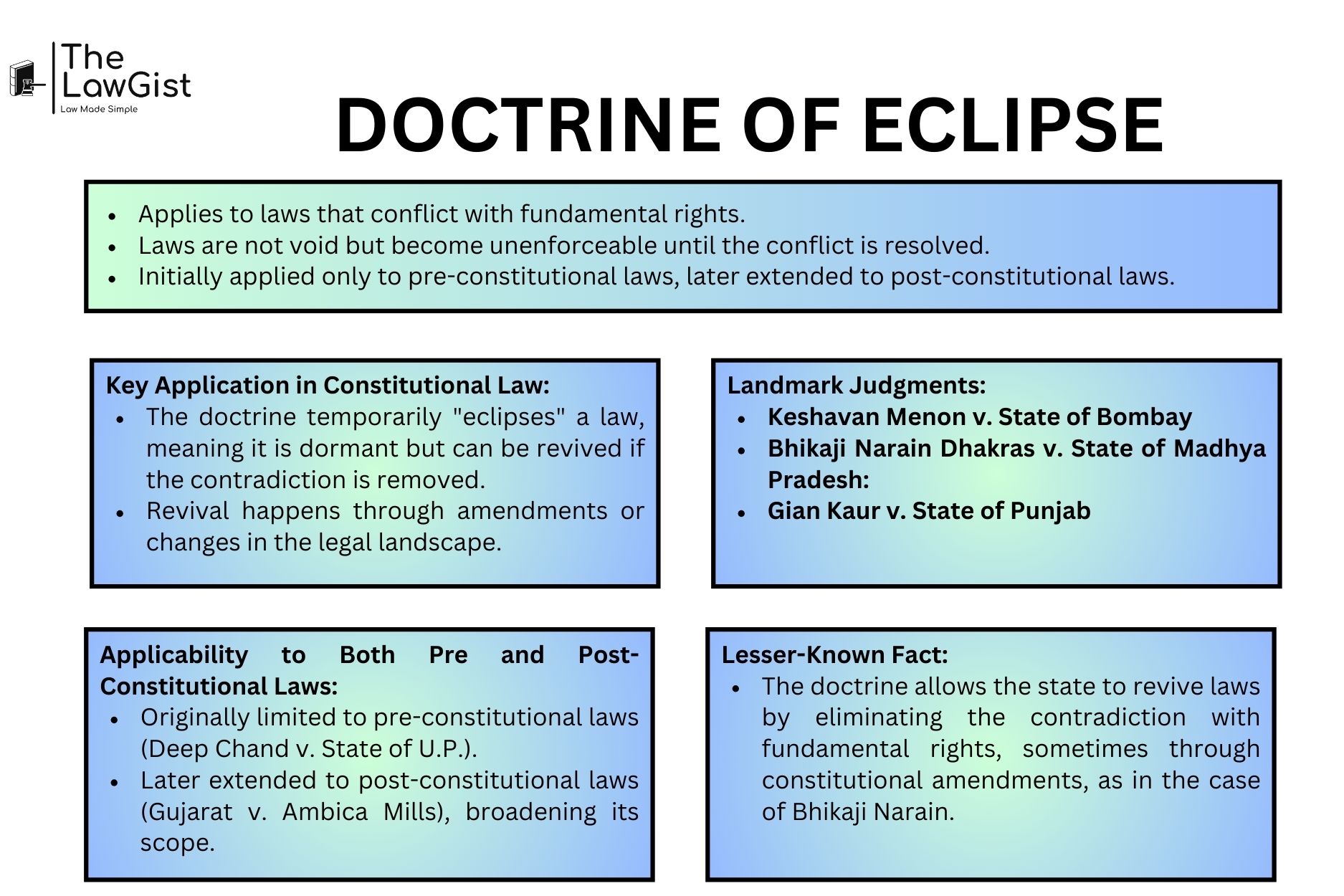
Eclipse happens when one thing overshadows the other. As the name implies, the Doctrine of Eclipse is used when any legislation or conduct breaches fundamental rights. In these cases, the fundamental rights overshadow the violated law or act, rendering it unenforceable but not void ab initio. The theory, however, only applies to pre-constitutional laws as held in Deep Chand v. State of U.P. that subsequently became contradictory in the case of Gujarat v. Ambica Mills where the court held that the Doctrine of Eclipse is applicable to post constitutional as well. This concept essentially declares the law to be dormant and unenforceable. Additionally, if there is a decline in the contradiction between the law and the basic right, the legislation may be revived through an official gazette. This is due to the fact that these laws never go away, even in cases where they are declared invalid. There are few landmark judgments where this doctrine was applied:
Keshavan Madhavan Menon vs. State of Bombay
The Press and Regulation of Books Act, held that people should not publish anything without seeking permission first from the authorities. If somebody publishes without permission, such a person would be liable to criminal penalties under another section of the law.
It was challenged by a litigant, who had suffered under it; he argued that the law was violating his right to freedom of speech guaranteed under Article 19(1)(a) of the Indian Constitution. The law was challenged by the Supreme Court under Article 13(1), whereby the Supreme Court declared whether the law was constitutionally valid or not. The court applied the “doctrine of eclipse,” and the law became dormant because of the conflict between the law and the Constitution.
However, the litigant could not find any remedy because the issue occurred before the Constitution was enforced and the Constitution doesn’t apply to events before its existence (no retrospective effect).
Bhikaji Narain Dhakras vs. State of Madhya Pradesh
In 1947, an amendment to Section 43 of the Motor Vehicles Act of 1939 permitted the government to assume control of the motor transport industry. This was contested as a violation of Article 19(1)(g), which guarantees the freedom to practise any profession. Later, the state was granted the authority to manage these companies by a constitutional modification to Article 19(1)(6). The 1951 Constitutional Amendment eliminated the contradiction and restored the law’s validity, according to the Supreme Court, which had previously declared that it had been “eclipsed” by the fundamental right.
Gian Kaur vs. State of Punjab
A case in which eclipse was eliminated, overruled the ruling in “P. Rathinam v. Union of India,” which had earlier declared that attempting suicide was a crime under section 309 of the Indian Penal Code, rendering it unconstitutional. Instead, the Gian Kaur case brought back this clause, which was previously overshadowed by Article 21 of the Indian Constitution. The court determined that section 309 did not violate the right to life since the attempt to die unnaturally did not fall under its ambit. As a result, the argument to override it was rendered immaterial.
India’s Constitution is notable for its fundamental rights. Therefore, in order to give rights priority over laws, the Doctrine of Eclipse is used for any act or legislation that conflicts with an individual’s basic rights.
Source- Supreme Court of India
Also Read-
Written By– Palak Bhuwalka
Edited By– Vishakha Khatri






